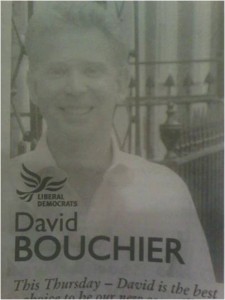The problem with poll cards, part two
 During the week I went over to help David Bouchier and his team in a council by-election in Camden. When knocking-up on the day, the most common query from people was ‘Do I need my poll card to vote?’ and that’s often the experience of people who go door-knocking on polling day.
During the week I went over to help David Bouchier and his team in a council by-election in Camden. When knocking-up on the day, the most common query from people was ‘Do I need my poll card to vote?’ and that’s often the experience of people who go door-knocking on polling day.
I’ve written before about just how awful poll cards look:
Poll cards look dull, uninviting and give you no reason to get interested in, or excited by, the prospect of voting …
It looks like a boring official document. It hardly leaps out for my attention from the doormat and does not make even the most cautious of attempts to interest me in elections …
Compare this poll card with the way in which your gas or electricity or water bill is laid out. Those are also documents that people don’t really rush to the doorstep with enthusiasm to read, but the companies issuing them know it is in their interest to try to present the information as attractively as possible – and they manage it, without undermining the basic objective presentation of information. It’s about time the humble poll card got the same treatment.
But these polling day experiences highlight an additional problem: there is a widespread misunderstanding amongst the public as to the role of the poll card. Uncertainty over whether or not you need a poll card can put people off if they don’t have it to hand (or if it got to them, which is a particular problem in urban areas dominated by flats).
Given that polling cards are not required to vote, is it not about time to test out having a design of them changed to more clearly get this message over so as to build up long term awareness, and also to test using the official publicity campaigns for elections to publicise this information more?
I’ve not seen any research that tries to single out the extent of the problem, so testing possible actions rather than leaping to definite action makes sense. What doesn’t seem to make sense is to continue as if there were not so many people raising the issue on polling day.